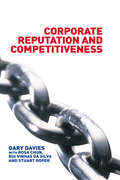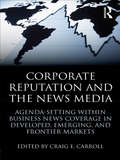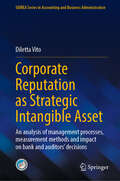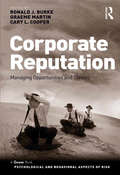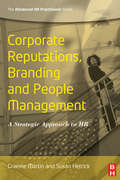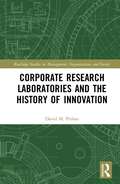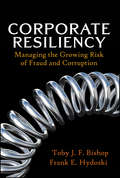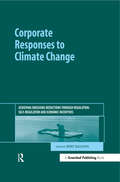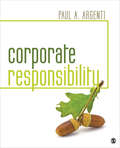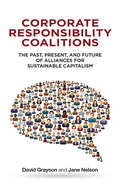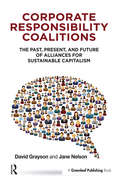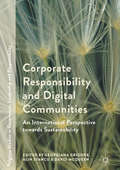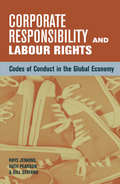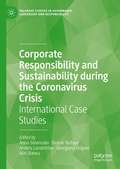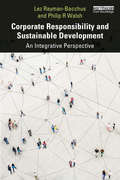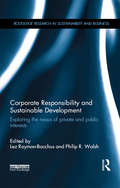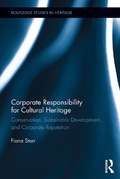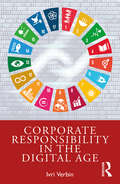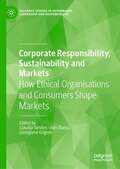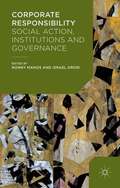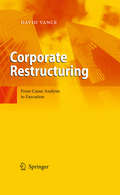- Table View
- List View
Corporate Reputation and Competitiveness
by Stuart Roper Rosa Chun Rui Da Silva Gary DaviesThis unique book written by four world leaders in reputation research, presents the latest cutting-edge thinking on organizational improvement. It covers media management, crisis management, the use of logos and other aspects of corporate identity, and argues the case for reputation management as a way of overseeing long-term organizational strategy. It presents a new approach to managing reputation, one that relies on surveying customers and employees on their view of the corporate character and in harmonizing the values of both. This approach has been trialled in a number of organizations and here the authors demonstrate how improving reputation, merely by learning more about what a company is already doing, is worth some five per cent sales growth. The book is a vital, up to date resource for specialists in corporate communication, public relations, marketing, HRM, and business strategy as well as for all senior management. Highly illustrated with over eighty diagrams and tables, it includes up to the minute illustrative case studies and interviews with leading authorities in the field.
Corporate Reputation and the News Media: Agenda-setting within Business News Coverage in Developed, Emerging, and Frontier Markets (Routledge Communication Series)
by Craig E. CarrollThis volume examines agenda-setting theory as it applies to the news media’s influence on corporate reputation. It presents interdisciplinary, international, and empirical investigations examining the relationship between corporate reputation and the news media throughout the world. Providing coverage of more than twenty-five countries, contributors write about their local media and business communities, representing developed, emerging, and frontier markets – including Argentina, Brazil, Chile, China, Germany, Greece, Japan, Nigeria, Spain, and Turkey, among others. The chapters present primary and secondary research on various geo-political issues, the nature of the news media, the practice of public relations, and the role of public relations agencies in each of the various countries. Each chapter is structured to consider two to three hypotheses in the country under discussion, including: the impact of media visibility on organizational prominence, top-of-mind awareness and brand-name recognition the impact of media favorability on the public’s organizational images of these firms how media coverage of specific public issues and news topics relates to the associations people form of specific firms. Contributors contextualize their findings in light of the geopolitical environment of their home countries, the nature of their media systems, and the relationship between business and the news media within their countries’ borders. Incorporating scholarship from a broad range of disciplines, including advertising, strategic management, business, political communication, and sociology, this volume has much to offer scholars and students examining business and the news media.
Corporate Reputation as Strategic Intangible Asset: An analysis of management processes, measurement methods and impact on bank and auditors’ decisions (SIDREA Series in Accounting and Business Administration)
by Diletta VitoThis book offers a comprehensive overview of corporate reputation, aiming to enhance understanding, management processes, and measurement methods associated with this crucial concept. By integrating perspectives from various disciplines such as strategic management, organizational theory, and accounting, the book presents a holistic framework for both enhancing and safeguarding corporate reputation. The book explores essential processes such as creating, acquiring, protecting, and repairing reputational capital, employing a stock and flow model to establish a robust framework for reputation management. Furthermore, the book studies the role of corporate communication and voluntary disclosure in establishing trust and credibility with stakeholders. It provides actionable strategies for reputational risk management and crisis management, emphasizing the critical importance of swift and transparent communication in safeguarding and restoring reputational capital. By addressing stakeholder-specific dynamics and offering detailed guidelines on reputation management, the book underscores the necessity of tailored efforts to meet the unique needs and concerns of diverse stakeholder groups. Designed for scholars, practitioners, business leaders, and students in business and management disciplines, this book aims to deepen their understanding of the strategic importance of corporate reputation.
Corporate Reputation: Managing Opportunities and Threats (Psychological and Behavioural Aspects of Risk)
by Graeme Martin Ronald J. BurkeIncreasing media scrutiny, global coverage and communication via the internet means corporate reputation can be damaged quickly, and failing to successfully address challenges to corporate reputation has consequences. Companies generally suffer almost ten times the financial loss from damaged reputations than from whatever fines may be imposed. According to Ernst & Young, the investment community believes up to 50 per cent of a company's value is intangible - based mostly on corporate reputation. So recognizing potential threats, or anticipating risks, emerges as a critical organizational competence. Organizations can regain lost reputations, but recovery takes a long time. Corporate Reputation contains both academic content along with practical contributions, developed by those serving as consultants or working in organizations in the area of corporate reputation and its management or recovery. It covers: why corporate reputation matters, the increase in reputation loss, threats to corporate reputation, monitoring reputation threats online and offline, the key role of leadership in reputation recovery, and making corporate reputation immune from threats. Any book that is going to do justice to a subject that is so complex and intangible needs imagination, depth and range, and this is exactly what the contributors bring with them.
Corporate Reputations, Branding and People Management
by Graeme Martin Susan HetrickThe book helps HR practitioners understand corporate-level concepts and their relevance to the key strategic agendas of organizations by drawing on a wide range of ideas from branding, marketing, communications, public relations and reputation management. It then examines how effective people management strategies and the role of HR specialist can contribute to this corporate agenda. This contribution lies in four key areas: organizational communications strategies, developing compelling employee value propositions and employer branding; HR strategies, employer of choice policies and talent management; creating new forms of psychological contracts and building stronger individual-organizational linkages through employee identification, employee commitment and psychological ownership; and in developing supportive employee behaviors. The book is based on a new model of the links between HR, corporate reputation and branding, developed from an extensive review and synthesis of different bodies of management literature. This model has been refined from extensive case research and practical experience in building corporate reputations and brands. Specially researched cases include Orange, Aegon, Scottish Enterprise, Hudson International, BSkyB, Standard Life Investments and the Royal Bank of Scotland.
Corporate Research Laboratories and the History of Innovation (Routledge Studies in Management, Organizations and Society)
by David M. PithanWith the beginning of the twentieth century, American corporations in the chemical and electrical industries began establishing industrial research laboratories. Some went on to become world-famous not only for their scientific and technological breakthroughs but also for the new union of science and industry they represented. Innovative ideas do not simply appear out of the blue and spread on their own merit. Rather, the laboratory's diffusion takes place in a cultural context that goes beyond corporate capital and technological change. Using discourse analysis as a method to comprehensively capture the organizational field of the early American R&D laboratories from 1870 to 1930, this book uncovers the collective meanings associated with the industrial laboratory. Meanings such as what and where a laboratory is supposed to be, who the scientist is, and what it means to practice science provided cultural resources that made the transfer of the laboratory from academic science into an industrial setting possible by rendering such meanings understandable and operable to big business and organizational entrepreneurs fighting for hegemony in a rapidly evolving market. It analyzes not only the corporations that established laboratories in the United States but also their contexts – economic, political, and especially scientific – showing how "the industrial laboratory" was transformed from an organizational novelty into an expected institution in less than two decades. This book will be of interest to researchers, academics, historians, and students in the fields of organizational change, discourse studies, the management of technology and innovation, as well as business and management history.
Corporate Resiliency
by Toby J. Bishop Frank E. HydoskiCorporate Resiliency: Managing the Growing Risk of Fraud and Corruption is written for members of boards of directors and audit committees, senior executives, those who advise or report to them, and those responsible for managing fraud and corruption risks. It describes in plain English terms a proactive fraud and corruption risk management process that can enhance corporate resiliency. The authors provide practical insights and highlight traps to avoid. Quotes from their interviews of business executives provide international perspectives regarding changes in fraud and corruption risks and techniques companies are adopting to deal with them.
Corporate Responses to Climate Change: Achieving Emissions Reductions through Regulation, Self-regulation and Economic Incentives
by Rory SullivanGiven the scale of the greenhouse gas emissions reductions that are seen as necessary to avert the worst effects of climate change, policy action is likely to result in a complete reshaping of the world economy. The consequences are not confined to 'obvious' sectors such as power generation, transport and heavy industry; virtually every company's activities, business models and strategies will need to be completely rethought. In addition, beyond their core business activities, companies have the potential to make important contributions to reducing greenhouse gas emissions through the allocation of capital, through innovation and the development of new technologies, and through their influence on the actions taken by governments on climate change.Corporate Responses to Climate Change has been written at a crucial point in the climate change debate, with the issue now central to economic and energy policy in many countries. The book analyses current business practice and performance on climate change, in the light of the dramatic changes in the regulatory and policy environment over the last five years. More specifically, it examines how climate change-related policy development and implementation have influenced corporate performance, with the objective of using this information to consider how the next stage of climate change policy – regulation, incentives, voluntary initiatives – may be designed and implemented in a manner that delivers the real and substantial reductions in greenhouse gas emissions that will be required in a timely manner, while also addressing the inevitable dilemmas at the heart of climate change policy (e.g. how are concerns such as energy security to be squared with the need for drastic reductions in greenhouse gas emissions? Can economic growth be reconciled with greenhouse gas emissions? Can emissions reductions be delivered in an economically efficient manner?).The book focuses primarily on two areas. First, how have companies actually responded to the emerging regulatory framework and the growing political and broader public interest in climate change? Have companies reduced their greenhouse gas emissions and by how much? Have companies already started to position themselves for the transition to a low-carbon economy? Does corporate self-regulation – unilateral commitments and collective voluntary approaches – represent an appropriate response to the threat presented by climate change? What are the barriers to further action? Second, the book examines what the key drivers for corporate action on climate change have been: regulation, stakeholder pressure, investor pressure. Which policy instruments have been effective, which have not, and why? How have company actions influenced the strength of these pressures?Corporate Responses to Climate Change is a state-of-the-art analysis of corporate action on climate change and will be essential reading for businesses, policy-makers, academics, NGOs, investors and all those interested in how the business sector is and should be dealing with the most serious environmental threat faced by our planet.
Corporate Responsibility
by James E. Post Archie B. Carroll Kenneth J. Lipartito Patricia H. Werhane Kenneth E. GoodpasterThis thought-provoking history of corporate responsibility in the USA is a landmark publication documenting the story of corporate power and business behavior from the mid-eighteenth century to the modern day. It shows how the idea of corporate responsibility has evolved over time, with the roles, responsibilities and performance of corporations coming increasingly under the spotlight as new norms of transparency and accountability emerge. Today, it is expected that a corporation will be transparent in its operations; that it will reflect ethical values that are broadly shared by others in society; and that companies will enable society to achieve environmental sustainability as well as a high standard of living. As we enter the second decade of the twenty-first century, the social, political and economic landscape is once again shifting: the need for an informed public conversation about what is expected of the modern corporation has never been greater.
Corporate Responsibility
by Paul A. Argenti"This is the cutting-edge textbook on a managerial approach to corporate responsibility. Students and executives will benefit a great deal by studying the cases and best practices that are here. It’s a terrific book." —Ed Freeman, Elis and Signe Olsson Professor of Business Administration, Darden School of Business, University of Virginia Corporate Responsibility offers a concise and comprehensive introduction to the functional area of corporate responsibility. Readers will learn how corporate responsibility is good for business and how leaders balance their organization’s needs with responsibilities to key constituencies in society. Author Paul A. Argenti engages students with new and compelling cases by focusing on the social, reputational, or environmental consequences of corporate activities. Students will learn how to make difficult choices, promote responsible behavior within their organizations, and understand the role personal values play in developing effective leadership skills.
Corporate Responsibility
by Paul A. Argenti"This is the cutting-edge textbook on a managerial approach to corporate responsibility. Students and executives will benefit a great deal by studying the cases and best practices that are here. It’s a terrific book." —Ed Freeman, Elis and Signe Olsson Professor of Business Administration, Darden School of Business, University of Virginia Corporate Responsibility offers a concise and comprehensive introduction to the functional area of corporate responsibility. Readers will learn how corporate responsibility is good for business and how leaders balance their organization’s needs with responsibilities to key constituencies in society. Author Paul A. Argenti engages students with new and compelling cases by focusing on the social, reputational, or environmental consequences of corporate activities. Students will learn how to make difficult choices, promote responsible behavior within their organizations, and understand the role personal values play in developing effective leadership skills.
Corporate Responsibility & Community Engagement at the Tintaya Copper Mine (A)
by V. Kasturi RanganLocated in the highlands of Peru, the Tintaya copper mine has long been a source of intense conflict between local community members and mine operators. The mine, which was owned and managed first by the Peruvian state and later by BHP Billiton, stands on 2,300 hectares of land expropriated from local subsistence farmers. In 2000, to contest this loss of land, mining-related environmental degradation, and allegations of human rights abuses, a coalition of five indigenous communities forged an alliance with a group of domestic and international NGOs to build their case against the BHP Billiton and pursue it directly with the company's Australian headquarters. The outcome of these efforts was the inception of a unique corporate-community negotiation process known as the Tintaya Dialogue Table. In December 2004, after three years of negotiation, BHP Billiton and the five communities signed an agreement compensating families for lost land and livelihoods and establishing a local environmental monitoring team and community development fund. However, just as the company resolves one conflict, another group of local stakeholders emerges with new demands--ones that the company may not be able to meet. The conflict with this new group culminates in a violent takeover of the mine in May 2005, whereupon BHP Billiton staff are forced to shut down operations, abandon the mine site, and devise a new strategy for winning back local support.
Corporate Responsibility Coalitions: The Past, Present, and Future of Alliances for Sustainable Capitalism
by David Grayson Jane NelsonIt is estimated that there are more than 110 national and international business-led corporate responsibility coalitions. Given the growing reach and significance of these alliances, there is now a critical need for an informed and balanced analysis of their achievements, their progress, and their potential. InCorporate Responsibility Coalitions, the first book to chronicle the subject, David Grayson and Jane Nelson explore the past, present, and future of these coalitions. They consider the emergence of new models of collective corporate action over the past four decades; the increasing number of these coalitions, their diversity and complexity; and how they network with each other and a broader set of institutions that promote sustainable capitalism. Drawing on their global study, the authors light the way for the future development of these influential alliances. In addition, they provide in-depth profiles of the most strategic, effective, and long-standing coalitions.
Corporate Responsibility Coalitions: The Past, Present, and Future of Alliances for Sustainable Capitalism
by David Grayson Nelson JaneThe significance of business-led corporate responsibility coalitions is indisputable. The WBCSD has 200 member companies with combined annual revenues of US$7 _trillion_; the UN Global Compact has almost 8,000 corporate members, over two-thirds of them from developing countries. It is estimated that there are more than 110 national and international generalist business-led CR coalitions. But there is now urgent need for informed and balanced analysis of their achievements, their progress and their potential.Why did these coalitions start and grow? What have been their impacts? Where are they heading now? Where should they be going? What is the future? In a period of austerity, the business and public sector must decide whether funding these coalitions is a priority.To meet current crises, there will have to be a great deal more business involvement; but efforts of individual corporations will not be sufficient. There is also a need for far more collective action among companies and more collaborative action between different sectors of society. Business-led CR coalitions with their decades of convening experience could play an important role in this process - if they are fit for purpose going forward.Authors David Grayson and Jane Nelson have been actively involved in such coalitions for decades. In Corporate Responsibility Coalitions they first explore the past, present and future of these coalitions: the emergence of new models of collective corporate action over the past four decades; the current state of play, and the increasing number, diversity and complexity in terms of how they not only network with each other but also engage in a much broader universe of institutions that are promoting responsible business practices. In addition, the book provides in-depth profiles of the most strategic, effective and long-standing coalitions, including: Business for Social Responsibility; Business in the Community; CSR Europe; Instituto Ethos; International Business Leaders Forum; the UN Global Compact; and the WBCSD.This book will be required reading for key supporters and potential partners of such coalitions in companies, governments, international development agencies, foundations, non-governmental organizations, academic institutions and think-tanks. It also aims to inspire a future generation of leaders to be more aware of the role of business as a partner in driving more inclusive, green and responsible growth, and to help them develop new types of leadership skills so that they can be effective in finding multi-stakeholder solutions to complex and systemic challenges.
Corporate Responsibility and Digital Communities: An International Perspective towards Sustainability (Palgrave Studies in Governance, Leadership and Responsibility)
by Georgiana Grigore Alin Stancu David McQueenThis book explores conceptualizations of CSR and sustainability in the digital economy, focusing upon points of intersection between CSR and online communities. Reflecting on new areas of responsibility that organisations must face in a globalised economy, the contributions explore the ways CSR is being communicated, challenged and reshaped in a rapidly evolving online context. Up-to-date research from around the world shows how diverse communities, citizens and stakeholders are engaging with, and making demands on, organisations in novel ways that pay little respect to international borders. With online communities increasingly influencing the way in which business is carried out and perceived, the case studies explored here offer a useful indication of the variety of new developments and controversies that have emerged in the field of CSR. This book will appeal to postgraduate students and researchers of CSR and CSR communications, as well as communication, public relation and corporate responsibility practitioners.
Corporate Responsibility and Labour Rights: Codes of Conduct in the Global Economy
by Ruth Pearson Rhys Jenkins Gill SeyfangThe emergence of voluntary corporate codes of conduct since the early 1990s is both a manifestation of and a response to the process of globalization. They have been part of a more general shift away from state regulation of transnational corporations towards corporate self-regulation in the areas of labour and environmental standards and human rights. This work provides a critical perspective on the growth and significance of corporate codes with a particular focus on working conditions and labour rights. It brings together work by academics, practitioners and activists.
Corporate Responsibility and Sustainability during the Coronavirus Crisis: International Case Studies (Palgrave Studies in Governance, Leadership and Responsibility)
by Anders Lundström Georgiana Grigore Alin Stancu Anna Sörensson Besrat TesfayeThis book seeks to understand how society and businesses are affected by, and respond to, the coronavirus crisis in various parts of the world. The volume explores: new CSR perspectives given the pandemic situation; SME perspectives and responsibility during the early stages of the pandemic; how large companies responded to the crisis; the challenges and opportunities provided by the use of digital technologies; and how leaders, entrepreneurs and individuals manage in uncertain times.Pulling together conceptual and empirical studies from Spain, Mexico, Sweden, Nigeria, Ghana and Kuwait , the book offers a truly international perspective as it examines how the pandemic has challenged a number of existing CSR assumptions, concepts and practices. It will be valuable reading for academics working in the fields of management, CSR, sustainability and crisis management.Anna Sörensson is assistant professor and researcher in Department of Economics, Geography, Law and Tourism at Mid Sweden University, Sweden.Besrat Tesfaye is Associate Professor of Business Administration at Södertörn University, Sweden.Anders Lundström is professor emeritus at Mid Sweden University and managing director at the IPREG (The Institute of Innovative Entrepreneurship), Sweden.Georgiana Grigore is Associate Professor in Marketing at University of Leicester, UK.Alin Stancu is Professor at the Bucharest University of Economic Studies, Romania.
Corporate Responsibility and Sustainable Development: An Integrative Perspective
by Lez Rayman-Bacchus Philip R WalshThis book explores the overlapping interests of corporate responsibility and sustainable development, specifically focusing on the dynamics of social change, sustainability governance and evaluation, and creating social value. Corporate Responsibility and Sustainable Development: An Integrative Perspective draws on ideas and research relevant to both concepts, highlighting the interdependent nature of corporate strategy and policymaker ambition. The authors seek to capture that any evaluation of responsibility for sustainable development demands multiple lenses. They propose an integrative understanding to tackling global challenges around sustainable development and focus on four themes: contextualisation; perspectives on social change; sustainability governance and evaluation; and creating social value. Overall, the book takes an evaluative approach, using these themes as lenses for engaging with global challenges, which encourages reflection and informed action. Written by two highly experienced authors, this book integrates short case studies and chapter questions throughout the text, in order to reinforce learning and help readers reconcile ideas presented with real world issues. It will be an essential resource for tutors and advanced undergraduate and postgraduate students of business, governance and corporate governance, corporate social responsibility (CSR), sustainability and sustainable development, stakeholder theory, business ethics, and politics.
Corporate Responsibility and Sustainable Development: Exploring the nexus of private and public interests (Routledge Research in Sustainability and Business)
by Lez Rayman-Bacchus Philip R. WalshCorporate responsibility and sustainable development are two concepts that may be able to reconcile many of the big challenges facing the world; challenges such as tensions between respect for the natural environment, social justice, and economic development; the long view versus short-term imperatives and the competing priorities between developed and developing economies. This book explores the gaps and overlaps between corporate responsibility and sustainable development. These concerns overlap because they implicate corporate practices, state development policy challenges, the concerns and priorities of non-governmental organisations, and the potential for innovative forms of organisation to address these challenges. This collection examines these questions in terms of tensions and interdependencies, between competing claims to resources, rights and responsibilities, strategy and governance, between public and private interest, and the implications for equity and the common good over the long term. This is a valuable resource for researchers, lecturers, practitioners, postgraduate and final year undergraduates in business strategy, international business and international management, public sector policy and management, international development, political economy. It is also suitable for more specialist courses on sustainability, corporate responsibility, governance and international development.
Corporate Responsibility for Cultural Heritage: Conservation, Sustainable Development, and Corporate Reputation
by Fiona StarrThis book examines the relationship between two divergent fields – corporate activity and heritage conservation – linking the financing of conservation and its benefits with the corporate social responsibility (CSR) goals of the private sector. Through discussion of physical conservation, benefits to heritage site visitors, sustainable development impacts, and corporate benefits such as improved reputation, this book outlines the shared value of corporate support for cultural heritage sites, and encourages financial and in-kind support for conservation and responsible activity by the private sector. Providing a convincing commercial rationale for CSR managers to engage with cultural heritage sites, this book suggests how companies may reap the benefits of CSR for heritage. Author Fiona Starr offers advice for companies looking to specialize in a unique CSR endeavor, especially those looking to engage with emerging markets. The book also provides useful strategies for heritage managers to attract CSR and financial support, offering new look at the financing of heritage conservation at both international and local levels and providing a new approach to the future of financing of cultural heritage conservation
Corporate Responsibility for Wealth Creation and Human Rights
by Georges EnderleGeorges Enderle proposes a radically new understanding of corporate responsibility in the global and pluralistic context. This book introduces a framework that integrates the ideas of wealth creation and human rights, which is illustrated by multiple corporate examples, and provides a sharp critique of the maximizing shareholder value ideology. By defining the purpose of business enterprises as creating wealth in a comprehensive sense, encompassing natural, economic, human and social capital while respecting human rights, Enderle draws attention to the fundamental importance of public wealth, without which private wealth cannot be created. This framework further identifies the limitations of the market institution and self-regarding motivations by demonstrating that the creation of public wealth requires collective actors and other-regarding motivations. In line with the UN's Guiding Principles on Business and Human Rights, this book provides clear ethical guidance for businesses around the world and a strong voice against human right violations, especially in repressive and authoritarian regimes and populist and discriminatory environments.
Corporate Responsibility in the Digital Age: A Practitioner’s Roadmap for Corporate Responsibility in the Digital Age
by Ivri VerbinThis book is a roadmap to help organizations adopt corporate responsibility and sustainability practices and be fit for purpose in a digital era. It explains why corporate responsibility is the only option in the twenty-first-century post-COVID-19 world, and guides readers through the process of transforming their organizations with continued reference to the importance of technology. This is not a technical manual, and it is not an academic textbook: it is designed to be a quick, easily digested read. The first part looks at the current landscape – both of business and of the world in which it operates. The second part explains why corporate responsibility is the only realistic option for business in the twenty-first-century, post-COVID, and who needs to take responsibility for it. The third part is a step-by-step guide to putting principles into practice, covering: values, stakeholder engagement, employees, supply chain, environment, community, customers and marketing, and reporting and transparency. Each chapter is linked to relevant UN Sustainable Development Goals and supported by dozens of real-world examples. By the end of the book, business leaders will have understood the scope of the challenge involved in leading a truly socially and environmentally responsible organization, and, crucially, will have understood why such a course of action is not only desirable but essential. And they will also have been inspired by a sense of purpose. The book offers direct access to the processes, insights, and techniques for installing corporate responsibility throughout organizations large and small, based on the author’s many years’ experience working in government and with successful large corporations. It is up-to-date and relevant, addressing the implications of COVID-19 and the modern technological “Fourth Industrial Revolution.”
Corporate Responsibility, Sustainability and Markets: How Ethical Organisations and Consumers Shape Markets (Palgrave Studies in Governance, Leadership and Responsibility)
by Georgiana Grigore Alin Stancu Cláudia SimõesThis book explores the interaction between sustainability, corporate responsibility, consumers, and the market. It aims to discover if consumers are seeking out small, ethical, socially responsible firms to buy from rather than large corporations; if markets and organisations are supported by a new sensitivity to social responsibility and sustainability ideas; if the integration of corporate responsibility strategies and practices change how market sectors are assembled. Bringing together international case studies – including research on the Italian wine industry, German butchers, Spanish football, Polish marketing and the Portuguese financial sector – this book is valuable reading for scholars working on corporate social responsibility, sustainability, and good governance.Chapter 12 is available open access under a Creative Commons Attribution 4.0 International License via link.springer.com.
Corporate Responsibility: Social Action, Institutions and Governance
by Israel Drori Ronny ManosThe decision to engage in corporate social action (CSA), and the debates regarding its costs, benefits and implications to corporate performance represent a demanding issue for scholars and managers. Research is inconclusive regarding the causal relations between CSA, corporate social performance (CSP) and corporate financial performance (CFP), despite numerous empirical and theoretical studies devoted to the issue. This book presents an in-depth study of corporate social action and the factors influencing a decision to engage in it. Going beyond the causal relationship between CSA and firm performance, the book stresses the link between CSA and a firm's core managerial policies and practices, reflecting the complexity and varied facets of CSA and the numerous internal and external factors that influence its outcomes. The book draws on the experiences of various industrial sectors to reveal the importance of a range of issues such as top management pay dispersion and ownership structure, which may influence the firm's decision to engage in CSA. It also explores some of the external influences on firms, such as institutional norms, the geopolitical environment and the industrial sector. The first part of the book provides an overview of the thematic issues of CSA and performance. The second part presents a series of empirical studies that examine factors and determinants of CSA. The third part presents case studies to illustrate the processes and outcomes of CSA policy and strategy in environmentally hazardous industries.
Corporate Restructuring: From Cause Analysis to Execution
by David VanceCorporate Restructuring is a practical approach to rescuing troubled companies and driving underperforming companies to top performance. It combines proven restructuring strategies with rigorous theoretical analysis. This book explains how to set and achieve asset, staffing, sales and profit goals. Topics include diagnostic tools to identify the root cause of problems, the human dynamics that cause a company to thrive or wither, customer service and relationship marketing, customer intelligence systems, new product development, process mapping, continuous process improvement and re-engineering as well as integrating IT into corporate strategy. It is also discussed how to find the resources needed to keep a company alive during restructuring and how to use bankruptcy offensively and defensively. Corporate Restructuring emphasizes execution. All the restructuring theories in the world weigh less than a simple plan, well executed.
